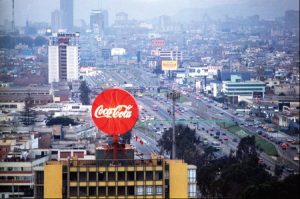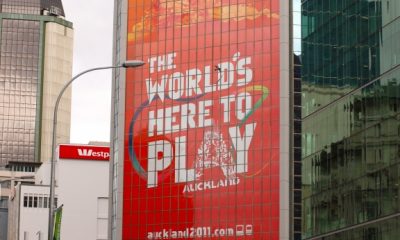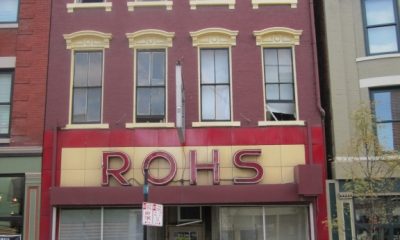Like many family-owned businesses, Neon Nieto S.A. started humbly in the home. Many family businesses eventually fold due to financial difficulties or disinterest from subsequent generations, but this company has grown into a multinational giant that’s one of South America’s largest sign companies.
Arnoldo Nieto, the company’s executive vice president and general manager, recounts the story of how the company began and now flourishes amidst globalization and economic flux.
Let there be light
In September 1937, Cecilio Nieto, then 25, lit the reportedly lit first neon tube ever bent in Costa Rica. During a trip to New York City several years before, he fell in love with the neon glow that emanated from the jazz clubs (his second-greatest enthusiasm) near Times Square.
Arnoldo Nieto, Cecilio’s nephew, said Cecilio’s entrepreneurial desire to cultivate a fruitful business spurred his quest to perfect neon fabrication. Now 95, Cecilio vividly recalls the furor his successful experiment caused.
“Several neighbors were alarmed that night when they saw the halo of fire-red neon glowing through my garage-door windows,” Cecilio said. “After several years of investigation and overcoming many challenges, we finally achieved success.”
Advertisement
Buoyed by his accomplishment, Cecilio and his elder brother, Cesar, founded Neon Nieto in 1937. Cesar provided Neon Nieto’s financial backing and allowed Cecilio to follow his passion of perfecting sign design and fabrication.
Solid business climate
Situated between Nicaragua and Panama in the southern portion of Central America, Costa Rica – a small nation whose geographic area approximates Vermont and New Hampshire combined – has long remained a beacon of democracy since its establishment as a republic in 1821. Its approximate 4 million population includes one-third living in or near San José.
Though Costa Rica’s economy maintains a significant agricultural component (bananas, coffee, cacao and sugar cane are among the nation’s principal exports), public and private entities have significantly grown the company’s manufacturing, retail and tourism trades. Of course, this has benefited Neon Nieto tremendously.
“Because our country hasn’t maintained an army since 1949, our government is able to allocate greater funding to education, healthcare and our country’s general welfare,” Arnoldo said. “This has created a strong democracy and stable economy.”
Though Costa Rica’s population and economic diversity have grown appreciably, the Nietos’ ambitions required expansion beyond their country’s borders. In 1962, the Central American nations of El Salvador, Guatemala, Honduras and Nicaragua laid the groundwork for vital commerce by establishing the Central American Common Market. Costa Rica joined the agreement one year later.
Advertisement
In subsequent years, the company’s relationships with local sign installers in the Dominican Republic, Ecuador and Colombia have allowed the company to market its sign products there. The newly ratified Central American Free Trade Agreement, which enables free trade between Central America, the Dominican Republic and the United States, will further boost the company’s opportunities abroad, as does a free-trade agreement with Panama.
Because the company works within relatively small markets, Arnoldo said it’s important to develop a reliable logistical organization to sell, install and maintain signage in its foreign markets: “The sign and electrical codes vary from country to country, and, for projects in the Caribbean, we’re dealing with different voltages. It’s an ongoing challenge to stay up to date with laws and trends in different markets. Also, convincing potential customers to invest in a quality sign that will last and, long-term, be cost-effective rather than buying what’s cheap now can also be an obstacle.”
A strong model
After several years of having created neon signs for local and regional businesses, the Nietos made high-quantity sign production central to the company. The development of Plexiglas® acrylic and other, clear-sheet plastics simplified the production of such signs, Arnoldo said. Naturally, multinational restaurant chains and oil companies, as well as beer and soft-drink bottlers, became prime targets. Arnoldo said, “Gaining the business of large companies gave us the opportunity to be part of large advertising budgets in very diverse markets.”
The first high-volume job entailed scores of window-hung, neon signs for Costa Rica’s Selecta Beer in 1955. Today, its client portfolio includes McDonald’s, ExxonMobil, TGI Friday’s, HSBC and Scotia Bank. As client needs have evolved from mere exterior-identification signage to incorporate POP, wayfinding, themed-interior environments and architectural signage, the company has broadened its scope.
Arnoldo said the company’s largest project to date involved comprehensive sign programs for HSBC’s approximately 200 recently acquired bank branches across Central America. Moreover, HSBC planned to unveil the newly christened branches the same day, which placed Neon Nieto under tight time constraints.
“The system required exterior monument signs, interior and exterior window signage, and a full complement of signage to identify office locations and where to access different services within each institution,” Arnoldo said. “This required constant control of fabrication and installation logistics to meet the specified deadline, but we did it.”
Advertisement
The company has also undertaken some unusual signage. Arnoldo said the shop’s most unusual fabrication to date comprised a rotating Coca-Cola® spectacular installed in Lima, Peru in 1996. This project was outside Neon Nieto’s standard service area, but Coke officials insisted it handle the job. Neon Nieto designed and manufactured a 33-ft.-diameter, rotating, double-faced sign that featured a neon curtain controlled by an electronic flasher the company designed and built inhouse. The shop shipped the sign to Lima in five, 40-ft.-long containers and sent its own people, with the help of local subcontractors, to erect a local landmark.
Today, Neon Nieto, which currently employs 240 people, has grown its San Jose campus into five buildings that encompass more than 100,000 sq. ft. As globalization makes the world smaller, Arnoldo said focusing on quality products and service will remain paramount to his companies.
“New markets and new competition are emerging every day. To succeed in today’s marketplace, a business must continually evolve and innovate and seek new relationships, while still maintaining your existing ones.”

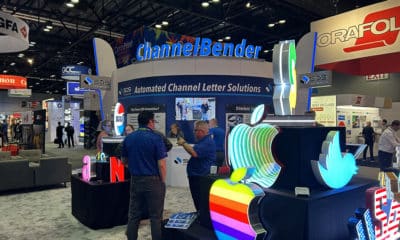
 Photo Gallery1 week ago
Photo Gallery1 week ago
 Ask Signs of the Times2 weeks ago
Ask Signs of the Times2 weeks ago
 Paula Fargo1 week ago
Paula Fargo1 week ago
 Real Deal4 days ago
Real Deal4 days ago
 Photo Gallery1 week ago
Photo Gallery1 week ago
 Women in Signs2 weeks ago
Women in Signs2 weeks ago
 Women in Signs1 week ago
Women in Signs1 week ago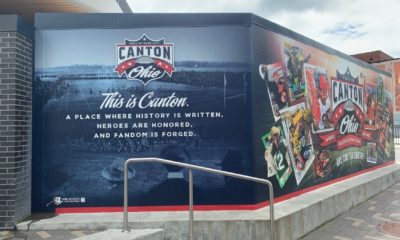
 Projects4 days ago
Projects4 days ago


